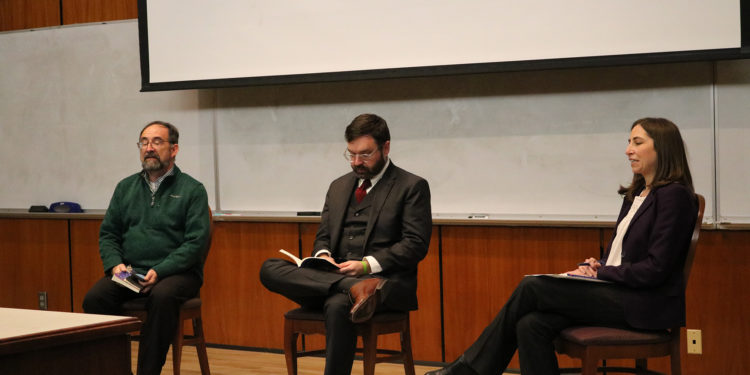On Feb. 3, author and scholar Jason Baxter visited Samford University to discuss his new book, “The Medieval Mind of C.S. Lewis: How Great Books Shaped a Great Mind.” The book explores the influence medieval literature had on Lewis and his work.
Baxter was joined in discussion by Samford professors P. Andrew Montgomery and Julianne Sandberg of the classics & philosophy and English departments, respectively.
Baxter began the evening’s discussion by tackling the question of what the term “medieval” means in the context of his book’s title. For Baxter, this is a difficult question to answer, but nevertheless, he did his best to articulate the atmosphere of the period which Lewis gravitated toward.
He explained how Lewis likened the aesthetic of the time period to that of a higher-level language being translated down to a lower-level language, of using the simple to describe the complex. To describe what he meant, Lewis would use the metaphor of a symphony being translated to a piano.
“For the medievals, this world of time and space is the piano keyboard, and the eternal world, the eternal verities, is the symphony,” Baxter explained. The symphony “represents this higher thing which you can recall, if you’ve heard it, but you can’t reduplicate it.”
So instead of attempting to accurately express the inexpressible, Baxter noted, the artists and scholars of the time instead chose to express these impossible concepts through the use of symbols and iconography.
The next topic Baxter discussed concerned if modern people were capable of having medieval minds. By this, he meant were those living in society today capable of taking on the perspectives and mindsets of those living at the time.
Baxter described the internal struggle philosopher Charles Taylor observed in specifically Christians in the modern world, which he called “the cross-pressures of modernity.”
“Part of the drama of being even a believer in the modern world is that we understand the non-religious explanations of this world,” Baxter said.
Because of this contrast, Baxter believes it’s hard for people living today to orient their minds in the same way people of the medieval era did.
“I think it’s difficult for moderns to have medieval minds, and I think that in some ways it might even have been something of a challenge for Lewis himself,” Baxter said. “That Lewis might have thought to some extent that he had the humble activity of just holding the torch.”
Montgomery argued that Lewis himself could be considered a good example of someone who balances both medieval and modern thinking, a middle ground between a strictly religious and a strictly secular view of the world.
“Isn’t Lewis himself kind of an example of someone who actually may bridge that gap?” Montgomery asked.
At the end of his lecture earlier that afternoon, Baxter had informed his audience how Lewis suggested that people read old books and went on to explain why in more detail during the evening’s discussion.
One important reason Lewis wished for people to read old books was because he believed it could correct some of their preconceptions about the latest thing being the best thing, or “chronological snobbery,” as he called it. He feared that advancements in technology had led not just to new knowledge, but also new ignorance, and that access to increasingly advanced tools had led to a loss of interiority.
“We have massive access to information, but we have very little knowledge as individuals,” Baxter said. “And I think our medieval ancestors would have gone even one step further. I think they would have been discontent even with the mere level of personal recollection of knowledge.”
Baxter and his fellow panelists urged their audience to metaphorically “download” information into their brains and not just “stream it.”
After their panel concluded, Baxter and the professors moved on to an audience discussion, where they talked about everything from diptychs and iconography to apophatic theology. The evening concluded with a special shout out to the organization hosting the event in partnership with Samford, Tactical Faith, which is a Birmingham-based non-profit looking to help train local churches in apologetics and theology.

Contributing Writer






